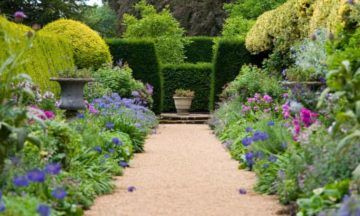Tim Dee in The Guardian:
 How does your garden grow? Meddling with the soil and what might sprout from it, we hope for a piece of paradise on Earth – in Xanadu, but also in Sidcup and Roath and Lossiemouth. It is necessary to cultivate your garden, Voltaire said, meaning pretty much whatever you’d like. All gardens are plots. They are projects for their gardeners and end up being projections of them too. Can Marc Hamer’s cultivation of someone else’s garden enlighten us on how to live well today? Green thoughts, Andrew Marvell said, come from any green shade, but Hamer doesn’t stop there. His first book, A Life in Nature or How to Catch a Mole, also traded in wisdom (and its corrections) got from nature. He is adamant that his gardening the 12 acres belonging to an elderly widow, Miss Cashmere, is “work”. But through his salaried labour comes an almanac of meditations or parables or thoughts-for-the-day, got from dandelions and roses, lawnmowers and secateurs, dead-heading and mulching.
How does your garden grow? Meddling with the soil and what might sprout from it, we hope for a piece of paradise on Earth – in Xanadu, but also in Sidcup and Roath and Lossiemouth. It is necessary to cultivate your garden, Voltaire said, meaning pretty much whatever you’d like. All gardens are plots. They are projects for their gardeners and end up being projections of them too. Can Marc Hamer’s cultivation of someone else’s garden enlighten us on how to live well today? Green thoughts, Andrew Marvell said, come from any green shade, but Hamer doesn’t stop there. His first book, A Life in Nature or How to Catch a Mole, also traded in wisdom (and its corrections) got from nature. He is adamant that his gardening the 12 acres belonging to an elderly widow, Miss Cashmere, is “work”. But through his salaried labour comes an almanac of meditations or parables or thoughts-for-the-day, got from dandelions and roses, lawnmowers and secateurs, dead-heading and mulching.
Hamer writes his plants well but finds knowledge awkward. His flower biographies (a striking number are poisonous) include the species’ scientific name, but he resists any other book learning and repeatedly says he knows very little – “I like my head to be clean and empty” – as if it were a spiritual goal to be de-cluttered of facts. He regards knowing the difference between a hawk and a falcon as clouding an encounter with any such bird: “Nature doesn’t waste its time on that.” This is strange (and wrong) – it must limit the breadth of what is written – but it suits Hamer who sees himself more green-man than professional plantsman, someone “horned” and “hooved” in the university of muddy life. It also puts him in the company of farm-labourer John Clare, who said he found his poems in the fields. A story at the heart of Hamer’s book turns on the poet.
More here.
